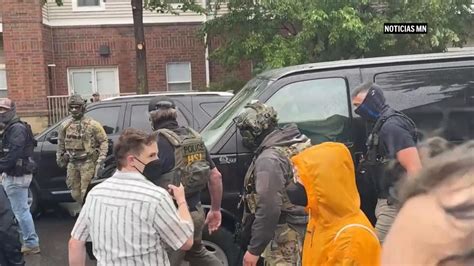
Federal officers in tactical gear sparked confusion and concern in Minneapolis neighborhoods this week, leading to inquiries from city officials and community members seeking clarity about their presence and purpose. The officers, identified as belonging to various federal agencies, were observed conducting operations without clear identification or coordination with local law enforcement, prompting worries about transparency and potential overreach.
Minneapolis city officials are seeking answers from federal authorities after heavily armed federal officers were seen operating in residential areas, causing alarm and raising questions about the scope and legality of their activities. The lack of clear identification and communication has fueled anxieties among residents and prompted urgent calls for transparency and accountability.
Residents and local representatives expressed their unease about the unannounced presence of these officers, highlighting the importance of community trust and the need for clear communication between federal agencies and the communities they operate in. Several incidents were reported where residents felt intimidated and unsure of the officers’ motives, amplifying concerns about potential civil rights violations and the erosion of community relations.
“We need to know who these officers are, what their purpose is, and how they are coordinating with local law enforcement,” said a city council member who requested anonymity, emphasizing the urgency of the situation. “The lack of transparency is unacceptable and undermines the trust we strive to build with our community.”
The deployment of federal officers in Minneapolis comes amid ongoing discussions about the appropriate role of federal law enforcement in local matters, particularly in cities experiencing heightened social and political tensions. The situation underscores the complexities of federal-local partnerships and the importance of maintaining clear lines of communication and accountability to ensure public safety and protect civil liberties.
Details of the Incident
Reports of heavily armed federal officers operating in Minneapolis neighborhoods began to surface earlier this week, with residents sharing photos and videos on social media platforms. These images depicted officers wearing tactical gear, some without visible identification, conducting patrols and engaging in what appeared to be surveillance activities.
The absence of clear identification and the lack of coordination with local law enforcement officials heightened concerns among residents, who expressed fears about potential escalations and the possibility of mistaken identity incidents. Several residents reported feeling intimidated by the officers’ presence, unsure of their authority and purpose.
“It was unsettling to see these heavily armed officers in our neighborhood without any explanation,” said Sarah Johnson, a resident of South Minneapolis. “We have a right to know who they are and what they are doing here. The lack of transparency is deeply concerning.”
City officials echoed these concerns, emphasizing the importance of clear communication and coordination between federal and local law enforcement agencies. They stressed the need for federal officers to identify themselves clearly and to work in collaboration with local authorities to avoid confusion and maintain community trust.
“We understand that federal agencies may have legitimate reasons to operate in our city, but it is essential that they do so in a transparent and accountable manner,” said Mayor Emily Carter in a public statement. “We are committed to ensuring the safety and well-being of our residents, and that requires clear communication and coordination between all law enforcement agencies.”
Federal Response and Justification
In response to inquiries from city officials and media outlets, federal authorities acknowledged the presence of federal officers in Minneapolis but provided limited details about their specific activities. A spokesperson for the Department of Justice stated that the officers were conducting “routine law enforcement operations” but declined to provide further information, citing ongoing investigations.
“Federal law enforcement agencies regularly conduct operations in cities across the country to address a variety of criminal activities,” the spokesperson said. “These operations are conducted in accordance with federal law and are designed to protect public safety.”
However, critics argue that the lack of transparency surrounding these operations raises serious questions about accountability and oversight. They contend that federal agencies should be required to provide more detailed information about their activities, including the specific reasons for their presence in Minneapolis and the legal basis for their actions.
“The public has a right to know why these federal officers are operating in their neighborhoods,” said civil rights attorney Maria Rodriguez. “The lack of transparency is a recipe for abuse and undermines the principles of accountability and the rule of law.”
Legal and Constitutional Considerations
The deployment of federal officers in Minneapolis raises important legal and constitutional questions about the limits of federal power and the protection of civil liberties. Under the U.S. Constitution, the federal government has broad authority to enforce federal laws, but this authority is not unlimited.
The Tenth Amendment to the Constitution reserves powers not delegated to the federal government to the states and the people. This principle of federalism limits the extent to which the federal government can intervene in matters traditionally handled by state and local authorities.
In addition, the Fourth Amendment to the Constitution protects individuals from unreasonable searches and seizures. This amendment requires law enforcement officers to obtain a warrant based on probable cause before conducting searches or making arrests.
Critics argue that the presence of unidentified federal officers operating in Minneapolis may violate these constitutional principles. They contend that the lack of transparency and accountability surrounding these operations raises concerns about potential violations of civil liberties, including the right to privacy and the right to be free from unreasonable searches and seizures.
“The Constitution protects us from arbitrary and intrusive government action,” said constitutional law professor David Miller. “The presence of unidentified federal officers operating in our communities without clear legal authority raises serious constitutional concerns.”
Community Impact and Concerns
The presence of federal officers in Minneapolis has had a significant impact on the community, raising concerns about safety, trust, and potential for escalation. Residents have reported feeling anxious and uncertain about the officers’ motives, unsure of how to interact with them and fearful of potential misunderstandings.
The lack of clear communication and coordination with local law enforcement has further exacerbated these concerns, creating a climate of mistrust and suspicion. Some residents have expressed fears that the officers’ presence could lead to increased tensions and potential violence, particularly in communities that have already experienced heightened social and political unrest.
“We are deeply concerned about the potential impact of these federal officers on our community,” said community activist Jamal Williams. “We have worked hard to build trust between law enforcement and the community, and the presence of these unidentified officers threatens to undermine that progress.”
Community leaders have called for greater transparency and accountability from federal authorities, urging them to provide more detailed information about their activities and to work in collaboration with local law enforcement to address community concerns. They have also called for increased community engagement and dialogue to ensure that residents’ voices are heard and their concerns are addressed.
“We need to have a conversation about the appropriate role of federal law enforcement in our community,” said community organizer Aisha Thompson. “We need to ensure that their activities are consistent with our values of transparency, accountability, and respect for civil liberties.”
Political Implications
The deployment of federal officers in Minneapolis has also raised significant political implications, sparking debates about the appropriate role of the federal government in local matters and the potential for political interference. Critics have accused the federal government of using law enforcement as a tool to advance its political agenda, particularly in cities that have been critical of federal policies.
They argue that the deployment of federal officers in Minneapolis is part of a broader pattern of federal overreach, designed to intimidate and suppress dissent. They contend that the federal government should respect the autonomy of local communities and allow them to address their own challenges without federal interference.
“This is a clear example of federal overreach,” said political analyst Michael Green. “The federal government is using law enforcement as a tool to intimidate and suppress dissent in cities that have been critical of its policies.”
Supporters of the federal government’s actions argue that federal law enforcement has a legitimate role to play in addressing criminal activity and protecting public safety. They contend that the federal government has a responsibility to intervene when local authorities are unable or unwilling to address serious threats.
“The federal government has a responsibility to protect the safety and security of all Americans,” said a spokesperson for the Department of Justice. “When local authorities are unable or unwilling to address serious criminal activity, the federal government has a right and a duty to intervene.”
Historical Context
The deployment of federal officers in Minneapolis comes amid a historical context of federal-local tensions and debates about the appropriate role of federal law enforcement in local matters. In the past, the federal government has deployed federal officers to address a variety of issues, including civil rights violations, organized crime, and terrorism.
However, these deployments have often been met with controversy and criticism, particularly when they have been perceived as heavy-handed or intrusive. Critics have argued that the federal government should respect the autonomy of local communities and allow them to address their own challenges without federal interference.
The history of federal-local relations is complex and often fraught with tension. The appropriate balance between federal and local authority remains a subject of ongoing debate.
Moving Forward: Calls for Transparency and Accountability
In the wake of the recent events in Minneapolis, there have been widespread calls for greater transparency and accountability from federal authorities. City officials, community leaders, and civil rights advocates have urged the federal government to provide more detailed information about its activities in Minneapolis and to work in collaboration with local law enforcement to address community concerns.
They have also called for increased community engagement and dialogue to ensure that residents’ voices are heard and their concerns are addressed. Some have even called for an independent investigation into the federal government’s actions to determine whether any laws or constitutional rights have been violated.
“We need a full and transparent investigation into what happened in Minneapolis,” said civil rights attorney Maria Rodriguez. “We need to hold those responsible accountable for any wrongdoing.”
The situation in Minneapolis underscores the importance of maintaining clear lines of communication and accountability between federal and local law enforcement agencies. It also highlights the need for greater community engagement and dialogue to ensure that residents’ voices are heard and their concerns are addressed.
Ultimately, the goal is to ensure that federal law enforcement activities are conducted in a manner that is consistent with the principles of transparency, accountability, and respect for civil liberties. This requires a commitment from both federal and local authorities to work together in a collaborative and cooperative manner.
The events in Minneapolis serve as a reminder of the importance of vigilance and the need to protect our constitutional rights and civil liberties. It is essential that we continue to hold our government accountable and to demand transparency and accountability from those who wield power. Only then can we ensure that our communities are safe, secure, and free.
The long-term consequences of the federal presence in Minneapolis remain to be seen. However, the events of this week have undoubtedly left a lasting impact on the community and have raised important questions about the appropriate role of federal law enforcement in local matters. The answers to these questions will shape the future of federal-local relations for years to come.
The need for a constructive dialogue between federal authorities and the Minneapolis community is paramount. This dialogue should focus on establishing clear protocols for federal operations within the city, ensuring that local law enforcement is fully informed and involved, and addressing the concerns of residents who feel intimidated or threatened by the presence of federal officers.
Furthermore, there is a need for ongoing training for federal officers on community relations and cultural sensitivity. This training should emphasize the importance of respecting civil liberties and building trust with the communities they serve. It should also address issues of racial bias and profiling.
The situation in Minneapolis also highlights the need for stronger oversight mechanisms to ensure that federal law enforcement agencies are held accountable for their actions. This could include the establishment of an independent civilian review board to investigate complaints against federal officers and to make recommendations for policy changes.
Finally, it is important to recognize that the challenges facing Minneapolis are not unique. Many cities across the country are grappling with similar issues of federal-local tensions and concerns about the role of federal law enforcement. The lessons learned from Minneapolis can inform efforts to address these challenges in other communities and to promote greater transparency and accountability in federal law enforcement.
The deployment of federal officers in Minneapolis has sparked a national conversation about the appropriate role of the federal government in local matters. This conversation is long overdue, and it is essential that it continues until we have reached a consensus on how to balance the need for public safety with the protection of civil liberties.
The future of federal-local relations depends on our ability to engage in open and honest dialogue, to address the concerns of all stakeholders, and to work together to find solutions that are both effective and just. The challenges are significant, but the rewards are even greater. A society that respects the rights of all its citizens and that is committed to the rule of law is a society that is worth fighting for.
The key takeaway from the Minneapolis situation is the critical need for clear communication, collaboration, and respect between federal and local authorities. Without these elements, trust erodes, and communities become fearful and divided. Moving forward, a proactive approach that emphasizes transparency, accountability, and community engagement is essential to prevent similar incidents and ensure the safety and well-being of all residents. The situation necessitates a careful review of existing protocols and a commitment to building stronger, more collaborative relationships between federal and local law enforcement agencies.
Frequently Asked Questions (FAQ)
1. Why were federal officers deployed in Minneapolis?
According to a Department of Justice spokesperson, federal officers were conducting “routine law enforcement operations.” However, the specific nature and purpose of these operations have not been fully disclosed, citing ongoing investigations. This lack of transparency has fueled concerns and demands for more information from city officials and community members.
2. Were local authorities informed about the federal officers’ presence and activities?
Minneapolis city officials have stated that they were not adequately informed about the presence and activities of the federal officers. This lack of coordination has been a major point of contention, as it undermines the ability of local law enforcement to effectively manage public safety and maintain community trust. Mayor Emily Carter emphasized the need for clear communication and coordination between all law enforcement agencies to ensure the safety and well-being of residents.
3. What legal authority did the federal officers have to operate in Minneapolis?
Federal law enforcement agencies have broad authority to enforce federal laws, but this authority is not unlimited. The Tenth Amendment to the Constitution reserves powers not delegated to the federal government to the states and the people, limiting federal intervention in matters traditionally handled locally. Concerns have been raised about whether the federal officers’ actions in Minneapolis exceeded their legal authority, particularly in the absence of clear communication and coordination with local authorities.
4. What are the concerns of Minneapolis residents regarding the federal officers’ presence?
Residents have expressed a range of concerns, including feelings of intimidation, uncertainty about the officers’ motives, and fears of potential civil rights violations. The lack of clear identification and communication has created a climate of mistrust and suspicion, particularly in communities that have already experienced heightened social and political unrest. Many residents feel that the federal officers’ presence undermines the progress made in building trust between law enforcement and the community.
5. What steps are being taken to address the concerns and ensure accountability?
City officials, community leaders, and civil rights advocates have called for greater transparency and accountability from federal authorities. They have urged the federal government to provide more detailed information about its activities in Minneapolis and to work in collaboration with local law enforcement to address community concerns. Some have called for an independent investigation into the federal government’s actions to determine whether any laws or constitutional rights have been violated. The goal is to ensure that federal law enforcement activities are conducted in a manner that is consistent with the principles of transparency, accountability, and respect for civil liberties.









